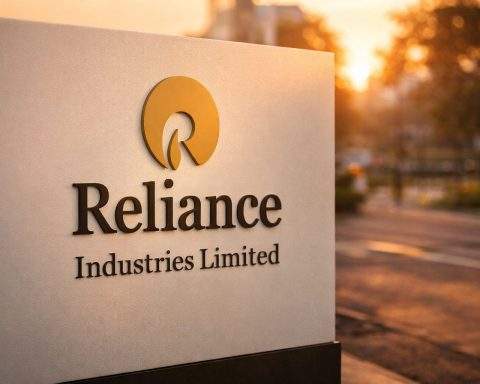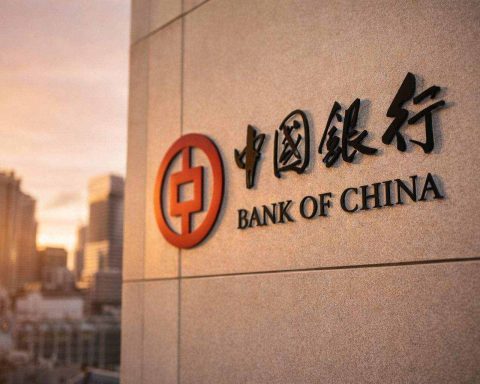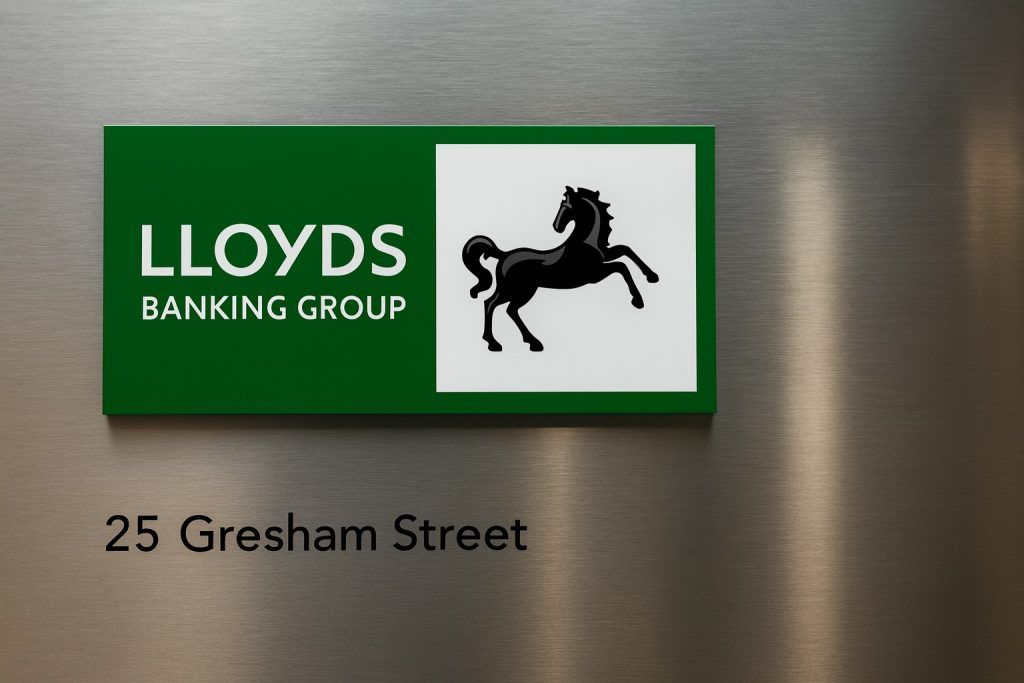London – 16 November 2025 – HSBC Holdings PLC (LSE: HSBA) heads into Monday’s trading session near its 52‑week highs, but with investors weighing a complex mix of strong underlying earnings, hefty legal charges, a bold Hong Kong acquisition, and shifting UK interest‑rate expectations.
Below is a concise pre‑open briefing on the HSBC share price for 17 November 2025, based on the latest available data and news.
1. Where the HSBC share price stands before Monday’s open
HSBC’s London‑listed shares closed on Friday, 14 November 2025 at 1,104.40p, down around 1.4% on the day after trading between 1,087.80p and 1,108.60p.1
Despite that pullback, the stock remains close to the top of its 52‑week range of roughly 699p to 1,126p, and has delivered about a 54% gain over the past 12 months.Investing.com Yahoo Finance data show a year‑to‑date return of just over 40% for HSBA, comfortably ahead of the FTSE 100’s gains.2
In New York, HSBC’s ADR (NYSE: HSBC) last closed around $72.56, off about 0.8% from the previous session and not far below its 52‑week high near $74.17.StockAnalysis The ADR’s modest retreat after a recent high suggests some consolidation rather than a decisive change in trend, but it may still provide a slightly softer tone for Monday’s London open.
2. Recent trading: from fresh highs to a mild pullback
HSBC has been one of the standout names in the FTSE 100 in recent weeks:
- On Wednesday, 12 November, MarketWatch reported that HSBC’s London shares climbed about 1.6% to £11.17, breaking a previous 52‑week high and outperforming the broader index.3
- In late October, HSBC shares helped drive the FTSE 100 to a new peak, as investors reacted positively to the bank’s updated guidance following its third‑quarter results.4
The slight dip on Friday leaves the stock just below its recent highs, which means technical traders will be watching whether HSBA can hold above the psychologically important £11 level and attempt another run at its 52‑week high early this week.
3. Q3 2025 earnings: headline profit hit, core strength underneath
HSBC’s Q3 2025 earnings, released on 28 October, remain the single biggest driver of the current share‑price narrative.5
Key points:
- Reported profit before tax:$7.3bn, down about 14% year‑on‑year, largely due to roughly $1.1–1.4bn of legal provisions, including a major charge linked to legacy involvement in the Bernard Madoff case and a French tax matter.6
- Underlying performance: Excluding these notable items, profit before tax actually rose by about 3%, reflecting healthier core operations.7
- Net interest income (NII): Management raised its 2025 NII guidance to around $43bn, citing slower‑than‑expected rate cuts in key markets such as Hong Kong and the UK and resilient loan margins.6
- Credit quality: HSBC booked around $1bn of expected credit losses, mainly against commercial real estate exposures in Hong Kong and mainland China – a reminder of continued stress in that sector.8
The market reaction has been broadly positive. Despite the profit drop, investors appear reassured that the hit is largely one‑off and that the core franchise continues to generate rising revenues, especially in wealth management and transaction banking.6
Going into 17 November, traders will still be digesting the balance between:
- short‑term capital and legal headwinds; and
- improved medium‑term earnings power, particularly if rate cuts progress slowly and Asia growth remains intact.
4. Hang Seng Bank buyout: the big strategic swing investors are still pricing in
Another major overhang – and opportunity – for the HSBC share price is its proposed HK$106bn (US$13.6bn) all‑cash offer to fully acquire Hong Kong’s Hang Seng Bank.9
The deal terms:
- HSBC already owns about 63% of Hang Seng Bank.
- It has offered HK$155 per share for the remaining 36.5%, representing roughly a 30–33% premium to recent trading levels and valuing Hang Seng at around HK$290bn (US$37bn).9
- To help fund the acquisition, HSBC has paused share buybacks for at least three quarters, after returning about $11bn to shareholders in 2024 and completing a further $3bn buyback in October 2025.5
Market reaction to the announcement in October was initially negative, with HSBC’s shares dropping roughly 5–7% in Hong Kong and London on concerns over reduced buybacks and increased exposure to Hong Kong property risks.10
However, management argues that:
- full control of Hang Seng should simplify the group structure,
- unlock cost and revenue synergies, and
- better align strategy across its core Asian franchises.11
For Monday’s open, any fresh commentary on the deal’s regulatory progress or shareholder feedback – especially from Hong Kong – could nudge HSBC’s share price in either direction.
5. Capital actions, debt issuance and share count
Beyond the Hang Seng proposal, HSBC has been active on the capital‑management front:
- The bank completed its $3bn share buyback on 24 October 2025, and a subsequent filing shows that about 26.8m shares were cancelled on 6 November, reducing the total number of shares in issue to about 17.18bn.12
- On the funding side, HSBC recently issued US$5bn‑plus of senior unsecured notes, including fixed‑to‑floating‑rate bonds due 2031 and 2036 and additional floating‑rate paper, bolstering its term funding profile.13
HSBC continues to target a CET1 capital ratio of 14–14.5% and a 50% dividend payout ratio (excluding major one‑off items), providing some visibility on future capital returns once the Hang Seng transaction and legal issues are further digested.7
For equity investors, the near‑term message is clear:
- Buybacks are on pause, but
- dividends remain core to the investment case, and
- the bank is still managing capital conservatively relative to its targets.
6. Dividends, yield and valuation going into 17 November
Income investors will come into Monday’s session after a key dividend milestone:
- HSBC’s third interim dividend for 2025 of US$0.10 per share (about 7.6p) goes ex‑dividend in London on 6 November and will be paid on 18 December 2025.14
- American Depositary Shares in New York went ex‑dividend on 7 November, with the same underlying payout.15
Because the ex‑div date has already passed, HSBC’s share price is no longer being “pulled up” by near‑term dividend eligibility, which partly explains some of the post‑ex‑dividend drift.
On current prices and trailing payouts, data providers estimate HSBC’s trailing dividend yield in London at around 4.5–5%, although forward‑yield estimates vary depending on assumptions about future interim dividends.16
Valuation looks relatively undemanding for a large global bank:
- Trailing P/E: roughly 15x earnings.2
- Forward P/E: around 9–10x, reflecting expectations of earnings recovery as one‑off legal costs fade and interest income stays robust.2
Analysts covering the ADR continue to rate the stock around a “Moderate Buy”, with US‑based summaries pointing to solid capital returns and exposure to faster‑growing Asian markets as key positives.17
7. Macro backdrop: Bank of England, rates and the FTSE 100
The broader UK environment remains crucial for the HSBC share price:
- The Bank of England held its base rate at 4% at its early November meeting, in a razor‑thin 5–4 vote, but signalled that further cuts are likely if inflation continues to cool.18
- UK unemployment has ticked up and growth is subdued, but falling inflation expectations and the prospect of rate cuts have helped push the FTSE 100 to record territory in recent weeks.19
For banks like HSBC, this mix is nuanced:
- Slower or shallower rate cuts support net interest margins longer than many had pencilled in for 2024–25.18
- But weaker economic activity and property stresses – especially in Hong Kong and mainland China – increase credit‑risk pressure, as reflected in HSBC’s higher ECL (expected credit loss) charges.8
Investors will also be watching broader systemic risks highlighted by both HSBC and the BoE around private credit markets. HSBC’s CFO and Governor Andrew Bailey have each warned about rising vulnerabilities in this opaque corner of finance, underscoring potential tail‑risks for large lenders with indirect exposures.8
8. Governance and strategic growth news you should know
A few additional headlines could influence sentiment around HSBC’s shares in the coming days:
- Chair succession: Reuters reported on 15 November that former UK chancellor George Osborne is among candidates being considered as the next Group Chairman, following Sir Mark Tucker’s resignation in September. Brendan Nelson is currently acting as interim chair while the search continues.Reuters Any credible governance update early this week could affect how investors view HSBC’s future strategic direction and regulatory relationships.
- Innovation Banking push: HSBC is aggressively expanding its Innovation Banking franchise – built partly on the acquisition of Silicon Valley Bank’s UK arm – and recently pledged US$1.5bn to support startups in Singapore, framing it as part of a global push into venture and growth‑stage lending.Reuters+2finews.asia+2 This adds a higher‑growth, albeit higher‑risk, engine to the group, reinforcing HSBC’s pivot towards tech‑ and healthcare‑focused clients in Asia and beyond.
These developments help explain why, alongside traditional dividend investors, there is renewed interest in HSBC from growth‑oriented and institutional buyers.
9. Key risks and catalysts to watch around the 17 November open
Going into Monday’s London session, traders and longer‑term investors in HSBC should keep an eye on:
- Follow‑through from Wall Street and global risk sentiment
If US financials or global bank stocks weaken further before London opens, HSBC could see additional pressure after its recent run‑up, especially given how close it is to 12‑month highs.20 - Hang Seng Bank deal updates
Any fresh signals from Hong Kong regulators, minority shareholders or credit‑rating agencies on the HK$106bn acquisition may move the stock, particularly if they affect expectations for future buybacks or capital ratios.11 - Legal and regulatory news
The Madoff‑related litigation remains an overhang. HSBC has already provisioned around $1.1bn following a Luxembourg court ruling, but total claims are significantly larger and outcomes remain uncertain.21 - Interest‑rate expectations and UK data releases
With the BoE in wait‑and‑see mode and markets pricing a possible December rate cut, any fresh UK or US macro data this week that shift rate expectations could quickly feed through to HSBC’s valuation multiples and NII outlook.18 - Dividend and income commentary
As the third interim dividend payment date in December approaches, commentary from income‑focused analysts and media – some of whom have highlighted HSBC as a relatively “cheap” income stock after a strong 2025 rally – may influence retail sentiment.22
10. Bottom line before the bell
Heading into the London open on 17 November 2025, the HSBC Holdings PLC share price is sitting near multi‑year highs, supported by:
- stronger‑than‑headline Q3 underlying earnings,
- resilient net interest income,
- a solid capital position and ongoing dividends, and
- a reinforced strategic focus on Asia through both traditional banking and innovation‑banking initiatives.
Set against that are three major overhangs:
- sizeable legal provisions and the possibility of further charges;
- the capital and execution risks around the proposed Hang Seng Bank buyout; and
- a more fragile macro backdrop in the UK and China, including stresses in commercial real estate and private credit.
For traders, Monday’s open will likely be about whether HSBA can hold above support around £11 and build on its breakout, or whether profit‑taking continues after a strong 2025 rally. For longer‑term investors, the key question is whether the current valuation – mid‑teens trailing P/E and a mid‑single‑digit yield – adequately compensates for the legal and macro risks alongside HSBC’s growing Asian opportunity set.2
Either way, those are the main factors to have on your radar before the London market opens.
This article is for information only and does not constitute investment advice. Always do your own research or consult a regulated financial adviser before making investment decisions.






